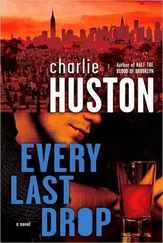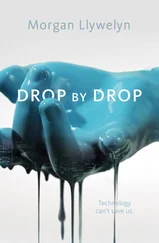She shaded her eyes with the slab of her hand and grinned at him. Wildflowers rose to her shins. Her skin glistened like buttered toast. He thought he'd never seen a picture so ready for framing. “So we build out to the east, then?”
“Depends on whether you like morning sun or afternoon. Of course, in the winter, we're talking moonlight. You ever been out here in winter-away from town, I mean?” He was thinking of Jill now, _Jill wants out.__ Everybody wanted out when the night set in, the night that never let up, when the cabin walls seemed to shrink till you felt like you were in one of those Flash Gordon serials where the walls came together like a vise to squeeze the pulp out of you. Flash always managed to escape, though. So did the better part of the women who came into the country, which was why there were three bush-crazy bachelors for every female in Boynton. The night took inner resources, and most people, women especially, didn't have anything more than outer resources to keep them going-shopping, gossip and restaurants with sconces on the walls, to be specific.
“I've been to Boynton,” she said. “I'm _from__ Anchorage.”
He wanted to explain to her that that wasn't enough, that was nothing, because in a town or a city you could always go to the bar or to a movie or watch TV, and sure, you wanted to see some sunshine, and maybe you flew to Hawaii, if you had the wherewithal, but the fact that it was dark day and night outside your gas-heated apartment's double-paned windows was no more than an afterthought. He wanted to tell her about the couple Jill had known who thought they'd try pioneering in an old miner's cabin up along the Porcupine River drainage and nearly fucked themselves to death out of sheer boredom, four, five, six times a day, till they were both rubbed to the consistency of flank steak and came out of there in spring looking like survivors of a concentration camp. After which they got divorced and probably went off to work in the doughnut industry. He held his peace, though, because she was too pretty and too pleased with herself and this wasn't the time or the place. This was the time for optimism, for love-for beginnings, not endings.
“I don't know,” she said, “I guess morning sun. What about you?”
“Afternoon sun's my ticket, which is why I put that little window to the west over there, but then your weather's coming down out of the northwest, and you can never get the window caulked up tight enough, not when the wind starts blowing.”
She wasn't listening. She'd balanced herself on one sylphine leg, a bare foot braced against her knee in the pose of a wading bird. She was looking off to the south, where a stand of black spruce clawed at the sky a hundred soggy yards off. “Is that what we're going to cut, that stand over there?” she said.
He came up to her then, took hold of her, rocked her in his arms. The trees were two hundred years old, at least, though they were no taller and no bigger around than fifteen-year plantation pines in the lower forty-eight. “I don't know,” he said, “those trees are awful pretty to look at. I thought we'd go upriver, maybe float some logs down like they did in the lumberjack days.”
“You've done that?”
No, he hadn't. He'd taken the wood for the present cabin from what was at hand, but he justified that to himself on the grounds that a cabin needed a clearing to stand in, and there were the stumps out there in the circumvallate yard, buried in fireweed, monkshood and yarrow. But it seemed like an idea, and he could see the two of them working side by side across the river from Roy's old place, maybe, he felling the trees and she knocking back the branches, and then just rolling them into the river and guiding them down with the canoe and some rope and maybe the gaff or a notched pole. It would be more work, especially down at this end, because the logs would take on water weight and they'd be a bitch to drag uphill, but then they'd need to dry out and season anyway. “Sure,” he said, “sure. It's no big deal. Especially now I have a royally tough bushwoman to do it all for me.”
For the next two weeks, he forgot all about his dead dogs, or at least he tried to. He and Pamela went up the Thirtymile each day and took white spruce off the riverbank for the roof poles, and black spruce that was maybe ten inches in diameter (and growing from seed when George Washington wasn't even born yet) from the hills stacked up in back of it. They packed a lunch and sometimes a supper too, and twice they camped under the stars in a steady drizzle of mosquitoes. The trees went down like cardboard and Pamela hacked tirelessly at the branches with a hatchet, the little-table look in her eyes day and night. They both felt the work, in their arms and shoulders and the rawness of their hands that pussed up, blistered over and toughened, and though they were exhausted by the time they quit for the night-sometimes as late as eight or nine-they found time to make love, in a sleeping bag or right out there on the sandy bank of the river, as if they'd invented the whole idea of sex and had to keep trying it out to make sure they'd got it right.
At the end of those two weeks they had a pretty fair collection of logs hauled up on the bar that fronted the cabin, and they were feeling pretty good about themselves, or at least that was the way Sess saw it. Pamela seemed to be enjoying herself, and never mind that she was a city girl and had her degree and could have been tanning herself at some resort on the Côte d'Or. She worked like a man, like two men, and she never stinted and never said quit until he did. And when the logs hung up on rocks or sleepers, as they invariably did, she was as likely as he to plunge chest-deep into the scour of forty-five-degree water to free them.
They were sitting there atop their log pile at the end of the last evening's run, forking up squares of the cold macaroni, tuna and cheese she'd made in the glare of morning, and looking up to the cabin where these logs would fit right into place, the worst part of the work behind them, when Pamela, in her khaki shorts and too-tight T-shirt, with her lumberman's hands and her hair pulled back tight, paused between bites and said it was time to go into town.
He gave her a look. The logs had to be peeled with an adze, hauled up the hill and stacked to dry, then notched and set in place. Then chinked. Then the roof had to go up and they'd both of them bust a double hernia working the center pole into place, if women got hernias, that is. “What for?” he said.
“And I don't just mean Boynton.”
“You want to go all the way into Fairbanks?”
She just nodded.
“Okay,” he said, and he would have driven her to Topeka and back if that was what she wanted, “I'll give it another try. What for? Shopping?”
“Oh, that's part of it,” she said, setting her plate aside. She perched atop the pile of river-run logs like a genie, as if all she'd had to do was snap her fingers to make them appear. “I do want some things to feminize that coot's den of yours, and stock up on groceries too-we might be eating moose all winter, but I see nothing wrong with some stewed vegetables, rice, condiments, pickles and all the rest to go with it. Lasagna. Spaghetti. Hershey bars. Saltwater taffy. Marshmallows.”
He pushed himself up, stretched his legs-he'd been sitting in one place too long and he felt the stiffness radiate from his backside and down both his thighs. “So that's it, marshmallows. The cat's out of the bag. Me and my wife are going to the big city for marshmallows.”
She gave him a grin that made him feel all over again what he already suspected-that he was no longer in charge of his own life and never again would be. “That's right,” she said, and paused to watch a cloud shaped like a wedding ring-or maybe a noose-blow over. “We're going to town for marshmallows.” Then her voice dropped and the grin disappeared. “And dogs. Don't you think it's time?”
Читать дальше












